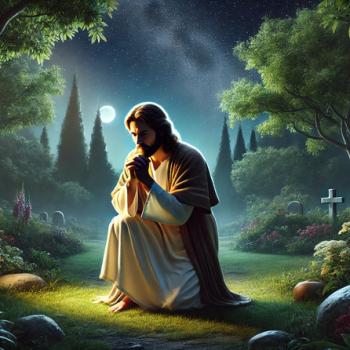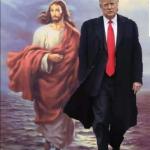Tribulation Force, pp. 295-297
"At last we meet," Nicolae Carpathia said, rising and coming around his desk to shake hands with Rayford Steele. "Thank you, Ms. Durham. We will sit right here."
Hattie left and shut the door. Nicolae pointed to a chair and sat down across from Rayford. "And so our little circle is connected."
Apart from the reminder that evil people say "Ms." instead of "Miss," this meeting doesn't seem all that suspenseful or perilous. Jerry Jenkins is barely bothering to suggest must menace or danger anymore in these now-routine one-on-one meetings with the Antichrist. Readers, by this time, are aware that Nicolae doesn't pose any real threat to our heroes — he just wants to hire them.
In other hands, that would be frightening in itself. A job offer from the Antichrist ought to provide the basis for some creepy storytelling (the word "headhunter" might take on a more literal meaning) and it could be the basis for some high-stakes, soul-searching dilemmas. According to Fritz Lang, the Jewish-born German filmmaker who gave us Metropolis, this actually happened to him in real life. He was summoned by Joseph Goebbels, who informed him that his latest film was being banned for anti-government sentiment, but that the Reich was so impressed with his talent, they wanted to offer him a job. Lang said he'd have to think about it, then fled the country.
But here the authors have drained all the suspense and tension out of these diabolical job offers by reassuring readers ahead of time that it's actually God's divine plan for Buck and Rayford to sign on as helpful members of the Antichrist's team. It may be just what Nicolae wants, but it's also just what God wants, because here in Tribulation Force, God and the Antichrist want exactly the same thing.
This is a central problem with the plot of this story that the authors are unable to resolve, or even to address, because it's also a central problem with the theology on which the book is based. For most of the next seven years of our story, Nicolae Carpathia's evil agenda and God's purportedly beneficent agenda overlap. God and the Devil are working from the same script, and it becomes impossible for our heroes to oppose the Devil because to do so would be to interfere with God's foreordained plan.
This creates a problem on the basic level of "what happens next?" Our band of supposed resistance fighters aren't actually allowed to resist, making them seem dull and directionless. They cannot do anything so they do not do anything. Our heroes cannot be active agents in a drama because there is no drama — no conflict — just a melodrama in which they are pawns and victims of events that will occur no matter what they do or say.
But on a deeper level, it also makes God seem like a cosmic jerk who is, essentially, indistinguishable from Nicolae or Nicolae's boss. If Nicolae even has a boss other than God himself. All of the persecution and tyranny Nicolae will soon be inflicting on humanity, we're told, is God's will — the divine plan for the End Times. And as bad as everything Nicolae does may be, it's actually a lot less painful and deadly than the evils to come that will be wrought directly by the hand of God.
With the two of them working in concert, it doesn't seem like the Antichrist is anti-Christ at all — he's Christ's servant, playing his ordained role in God's great plan. Every evil deed Nicolae has in mind is what the "prophecy" says will happen and therefore it is what must happen and thus — and this is where we fall through the looking glass into a warped and bizarre alternate universe — it is what ought to happen. This traps readers and heroes alike in an insane world where the purported moral obligation of good people is to facilitate evil, to ensure injustice, oppression and suffering, to clear a path for the Devil and all his works.
Given such a moral universe, our heroes cannot be heroes. Such a world does not allow for heroism. When God and the Devil, good and evil, all demand exactly the same actions, then what can a hero do? Show up in the nick of time to help tie the damsel to the railroad tracks?
Take any bona fide hero — Robin Hood or Buffy Summers or Frodo Baggins or whoever your favorite might be — and transport them into such a universe. What would they do? They'd have no choice, really, being heroes, but to set out to subvert and prevent the prophecies one by one, to find some way to throw a monkey wrench into the gears of this evilgood cosmic machine and bring the whole thing to a halt. No hero could do otherwise and still be a hero.
By creating a moral universe in which God and the Devil are conspiring together, the authors have given us a book in which it would be the duty of a hero to oppose God. And strangely they have also given us a book in which it would be the duty of any fiend to oppose the Devil. So any bona fide villain would be compelled to go about monkey-wrenching destiny right alongside the heroes. The strange alliance of the diabolical and the divine at the heart of the authors' world would be paralleled by a similar alliance of heroes and villains against it. The cosmic forces uniting — and therefore abolishing — good and evil would be opposed by the champions of both sides.
Most prophecy-oriented stories avoid this problem either by introducing a second, competing prophecy, or by allowing for other, competing interpretations of the main prophecy. That creates the possibility of choices and consequences, the possibility of morality and therefore of heroism and villainy.
But Tim LaHaye's purpose in creating this series of books is, in part, to deny the possibility of any competing vision or interpretation. His view of prophecy isn't like the ambiguous pronouncements of the Delphic Oracle. No ambiguities can be permitted. No ambiguities, therefore no options, therefore no choices, therefore no heroes, no good and no evil, no God and no Satan, and no real differences in the goals or agendas of the two characters we find here, sitting across from one another, chatting politely about Rayford's future career as the personal pilot of the Antichrist.
Nicolae muses on the string of connections that brought Rayford here, starting with his own friendship with Chaim Rosenzweig:
"He introduced me to a young journalist who had written about him. That journalist met your flight attendant, Ms. Durham, while on your plane, and eventually introduced her to me. She is now my assistant, and she introduced you to me. A small world."
… Rayford did not respond to Carpathia. He didn't believe they had met coincidentally. It was not such a small world.
That has a hint of menace to it — suggesting that Nicolae Carpathia is an insidious puppet-master pulling the strings. No such thing as coincidence where Nicolae is concerned — he has eyes everywhere, agents and spies manipulating outcomes from behind the scenes.
Except it turns out that isn't what Rayford means. As he sees it, the shadowy puppet-master here is God:
Rayford did not respond to Carpathia. He didn't believe they had met coincidentally. It was not such a small world. It was possible all had been where God had wanted them to be so Rayford could be sitting where he was today.
It's all God's will. And Rayford's role in following God's will is entirely passive — all he needs to do is allow himself to be steered along, to accept whatever comes his way knowing that it's never coincidence, but part of the plan. If the evilest man on earth offers him a job, that must mean that he should take it.
I can't help but wonder if Nicolae has the same view — if he, too, sees himself as a passive balloon, floating on the winds of some grand scheme he cannot control, only accept. The authors seem to think of him that way. He may be the Antichrist but, just like Rayford, he's wound up just where God wanted him to be.
"I'm an incredibly arrogant man," Rayford tells Nicolae. "I need you to stroke my ego by begging me to take this job while I insult you and feign disinterest." He doesn't use those exact words, of course, but it couldn't be clearer over the course of the next page or so that this is exactly what he is saying. Nicolae shrugs this off or pretends not to notice, just as he has in every one of his conversations with Buck Williams.
Nicolae tells Rayford to hold off judgment until he sees the plane:
"Mr. Steele, I want to make a prediction. I want to presume that you will see this plane, experience the latest technology, and want never to fly anything less."
And then he offers one final word of caution about the Antichrist workplace:
"You realize, of course, that should you get this job — and you will — that this is not a platform for proselytizing."
"Meaning?"
"Meaning that the United Nations, which shall become known as Global Community, and I in particular, are proactively nonsectarian."
Immediately before this meeting with Rayford — just 20 pages ago — Nicolae was standing at the microphone announcing to the world the foundation of his new one-world religion, the "Global Community Faith." He has just finished declaring himself to be emphatically sectarian. He has just informed everyone else that, whether they like it or not, they must now be sectarian too.
Yet here he is telling Rayford that he is "proactively nonsectarian" and Rayford is nodding along, as though that wasn't a 180-degree reversal of the official, global policy that he himself declared less than an hour ago.
What this tells us, I think, is that neither Nicolae Carpathia nor Rayford Steele actually understands the meaning of that phrase "proactively nonsectarian," and that the authors are unable to help them out because they don't know what it means either.
I'm not entirely sure what "proactively" is supposed to mean in this context. I think the word got picked up here due to sounding vaguely like "pervasively" — as in the legal phrase "pervasively sectarian," which is what I think was kicking around, dimly misunderstood, in Jenkins' brain when he typed that passage above. That he seems to regard the words "sectarian" and "nonsectarian" as interchangeable arises, I'm guessing, from a popular bit of confused sophistry among LaHaye's tribe of evangelicals, which teaches that secularism is, itself, a form of religion.
If you want to understand why Nicolae and the authors would say this, read a copy of Richard John Neuhaus' The Naked Public Square and do a shot every time he uses the word "secular" and chug every time he uses the word "secular-ism." When the room starts spinning and the floor hits you in the back of the head, as you begin to pass out, aspirating on your own vomit, it will all begin to make sense. You'll realize that sectarian and nonsectarian are synonyms, that the establishment clause violates itself, that the refusal to coerce others to accept religious dogma is itself nothing more than a bit of religious dogma, and that there's nothing left to do but reconvene the Inquisition.
Or something like that. Really, I'm not sure — I've been trying to follow this argument for decades but I always lose track of it shortly after it flies off the rails and goes spinning into the abyss.
Anyway, Rayford still doesn't see any distinction between personal conversations with co-workers and religious harassment, so he doesn't much care for this no-proselytizing rule:
"I am a believer in Christ," Rayford said. "I attend church. I read my Bible. I tell people what I believe."
And that, in a nutshell, is the authors' five-sentence definition of what it means to be a Christian.
It's only four sentences, you say? Well, yes, Rayford left out the fifth, traditionally unspoken, sentence: "I am become as sounding brass, or a tinkling cymbal."
"But not on the job."
"If you become my superior and that becomes a directive, I will be obligated to obey."
"I will and it will and you will," Carpathia said. "Just so we understand each other."
"Clearly."
"I like you, and I believe we can work together."
That's nice of Nicolae to say, but it's a bit of an odd thing to say to someone you're hiring as a pilot. Try that yourself next time you're walking by the pilot as you board a plane: "I believe we can work together." On second thought, don't try that — it would probably earn you a trip to the full-body scanner.
"I don't know you, sir, but I believe I can work with anybody." Where had that come from? Rayford almost smiled. If he could work with the Antichrist, who couldn't he work with?
Again, I could approve of Rayford taking this job as a way of infiltrating the Antichrist's inner circle, thereby gaining access to invaluable information that could be used to foil his plans. But Rayford doesn't want to foil Nicolae's plans. If anything, he wants to make sure that those plans come to pass exactly as they are prophesied.
And somehow while he goes to work for the Antichrist, ferrying him from place to place around the globe, carrying his water and holding his coat, we're supposed to regard Rayford as good and Nicolae as evil. In the context of this book, I just don't see the difference.
















